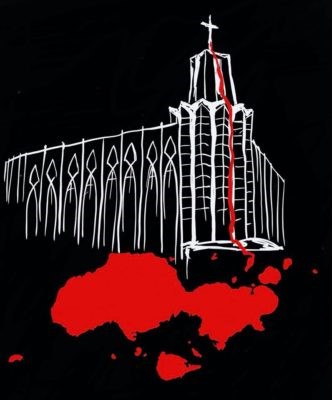Greenheart Hermitage
(CBCPNews and Agencies) The search for peace in Mindanao should not be derailed by the deadly bombing of a Catholic cathedral in Sulu province, a church official said Monday.
Jesuit Archbishop Antonio Ledesma of Cagayan de Oro said the peace process must continue to pursue the end of decades of rebellion in the country’s restive south.
“We hope that the incident will not sidetrack us to lasting peace,” Ledesma said in a press conference after the bishops’ plenary assembly in Manila.
On Sunday, January 24, two suicide bombers detonated explosive belts inside the Cathedral of Our Lady of Mount Carmel in Jolo (Sulu) and near the parking lot. Twenty-seven persons, including five soldiers and a Coast Guard member were killed in the attack, while 77 others were reported injured.
Speaking in Panama on the last day of World Youth Day Jan. 27, Pope Francis expressed “the most firm reprobation.”
“I raise my prayers for the dead and wounded. May the Lord, prince of peace, convert the hearts of the violent and give the inhabitants of that region a peaceful coexistence,” he said.
Fr Romeo Saniel, OMI, Apostolic Administrator of Jolo, said that most of those who died were his personal friends. He issued the following statement upon hearing of the bombing.
“Please pray for the victims of Mount Carmel Cathedral bombing in Jolo. Bishop Lito Lampon and I were attending the 118th CBCP Plenary in Manila when we heard the tragic news. I am now at Manila Airport as a waitlisted passenger for Zamboanga. If I can’t make it tonight, I will take the military plane tomorrow early morning and join the group of Sec Lorenzana who will visit Jolo.
“Most of those who died were our regular Sunday 8 AM Mass goers. Daisy Barade delos Reyes was formerly the PPC President, Romy Reyes and his Leah were my personal friends. I’m still waiting for the final list of victims. They bravely stayed in Jolo in spite of the threats and insecurities. I believe they have died for their Christian faith. No words can describe the sorrow and pain that we feel these days. May they be given justice in God’s time. I know that the friends of the victims (both Muslims and Christians) are mourning and in deep sorrow today. Pray also pray for the families of our young soldiers who died while securing the Cathedral. Bishop Ben please intercede for us. Our Lady of Mount Carmel please protect us from all evil.”
Philippine President Rodrigo Duterte on Monday afternoon inspected the cathedral in Jolo and also visited the wounded.
It was not the first time that the Cathedral had been attacked. Msgr Angelito Rendon Lampon, former bishop of Jolo and new archbishop of Cotabato, said: “In my 20 years, from 1998 to last week, there have been seven hand grenades launched at our cathedral.”
Father Ricky Bacolcol, the priest saying Mass at the Jolo Cathedral when the bombs were detonated had experienced something similar in the past. On December 25, 2010, an improvised explosive device went off in a police camp chapel in Jolo, Sulu, wounding Bacolcol and 10 Mass-goers during a Christmas Day Mass.
In 1997 Jolo’s Apostolic Vicar Benjamin David De Jesus, OMI, 56, died instantly when he was shot in the head as he left the Cathedral at 9:30 AM on Feb. 4.
In 2000, Oblate Father Benjamin Inocencio, chancellor of Jolo vicariate in the Philippines, was shot dead Dec. 28 a few meters from the Cathedral.
In response to the attacks, Davao City Mayor Sara Duterte-Carpio has ordered a ban on backpacks in churches and other places of worship in Davao City.
The Archdiocese of Davao has released a list of prohibited items inside churches following the bombings of Jolo cathedral.
Bags and boxes are among the many items included on the list.
Knapsacks, backpacks, cartons, and the like are also banned inside parish churches and chapels.
“Only small purses and the like are allowed,” Archbishop Romulo Valles of Davao said in a circular issued on Jan. 29.
The archbishop said the directive will be in effect until further notice due to “current threat of violence” in the region.
He also said that the archdiocese has to take up security measures upon the advice of law enforcement agencies.


 Follow
Follow


